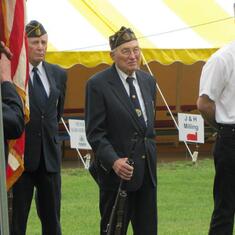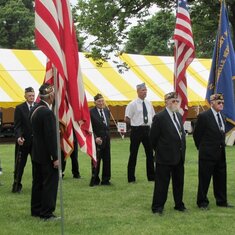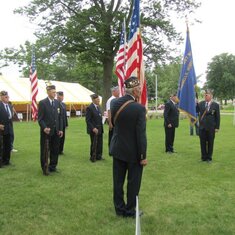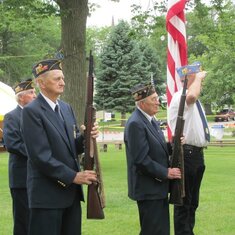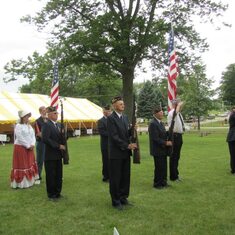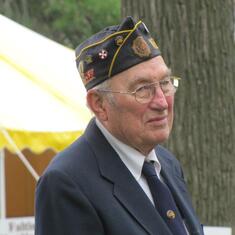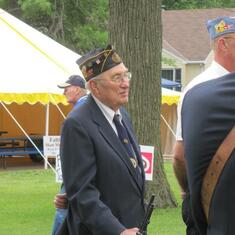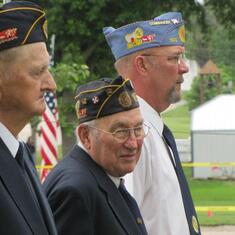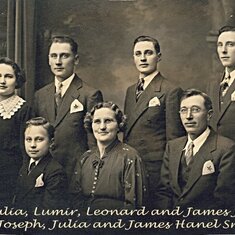My Army Life in Korean War
The latter part of 1947, I got drafted into the Army. I was sent by to Fort Riley, Kansas. Fort Riley consisted of different post. Fort Riley was the main post at one time. During the Indian Wars, was a horse Calvary post. In the past, was Camp Funston, that was an infantry training post. Camp Winside was an officers’ training post. There was also a camp for women that were called WACS. Camp Funston was the 10th Infantry Mountain Division. I was in Company C. A Company consisted of 4 platoons and each platoon had 50 men. There were so many companies that made the division. The Company had a commander that was a Captain. A Lieutenant, a Sergeant and two cadre men ran each platoon??? Where the Captain, and the first Sergeant of the Company were in an office called the orderly room. A Supply Sergeant and Supply Officer ran the supply room. A Mess Sergeant and Mess Officer and cooks ran the Mess Hall. When I got to Camp Funston, we were issued our army clothes, we got our short haircut and we were assigned to our barracks that was two stories. Our clothes that we came with were sent home. First lesson we learned was how to make our beds. The blanket on the top of the bed had to be stretched so tight. The inspectors would drop a quarter on it and it had to bounce so high.
The clothes were hung on a rack with two fingers spacing between the hangers. The clothes were all pointed one way. We were given footlockers. That was for underwear, socks and personal items. There was a certain way each item was placed in the locker. We had weekly inspections. Two officers and one enlisted man made inspections. We had to stand at attention by our footlockers. One officer wore white gloves. He would take his glove and see if he could find any dirt. If you didn’t pass, you got so many demerits. That went against your weekend pass. Also, your combat boots had to be spit polished. That meant you polished them, you spit on them, and polished more. So you could see your face in them. Our issue of clothes were one set of dress uniform, one set of woolen OD’s and 2 sets of suntans, six sets of fatigues. Fatigues were only worn for training. We were issued full field pack that held our sleeping bag, also a one-man tent, spade, first aid kit, M1 Rifle. If you lost any item, you had to pay for it. Also, a steel helmet. Our training was an eight-week training cycle. We were given serial numbers…mine was US55009677. Being I was drafted, I started with US in front of my serial number. If I had enlisted, it would have started with RA. When I got out, I had to sign up for the Reserve Corps and it then started with ER. The army looked down on the US drafts. They never got the promotions that the enlisted men got.
Our training started at 5 o’clock in the morning. We were waked up, this was called Revelries. We had only a few minutes to get dressed and fall out in front of the barracks in platoon formation. You lined up for all formations. One arms length to the front of you and one arms length to the right of you. We had roll call. The first roll call they did not pronounce my name correctly, or the way I was used to hearing it. I didn’t answer when they called it. They had me down as AWOL. Boy, did I get chewed out. The first morning in formation, the cadre (instructors), he went to each one of us face to face. He’d yell at us, what bad things we were doing and how bad a person we were. We were not to laugh or move. I did once, and he told he me was going to wipe the smile off my face and he did hit me in the mouth. Later on, I learned this was our training. This was the way you had to learn to take the pressure of orders. We then did half hour of calisthenics, push-ups, and sit-ups. We then were marched for breakfast or chow. Their famous breakfast was ground hamburger with gravy on toast. The rest of the days were spent going to classes, marching in formation. We had to learn how to take our M1 Rifles apart, clean each part and put it together blindfolded. This was in warfare…you may have had to clean your rifle in total darkness. They impressed on you, your rifle was your friend and you treated as such.
Every day if we fired our rifle, it had to be cleaned. If you didn’t, the barrel could get corroded and the bullet could get lodged in the barrel. If that happened, the rifle would explode in your face. The longest you could go was two days. We attended classes and field demonstrations. First Aid, Survival in Combat, digging foxholes. We would start marching one mile per day and that kept increasing each day. The day ended with taps in the evening. Lights were out at 9 o’clock and at 11 o’clock a man from the orderly room made bed checks to be sure each one was in bed then. Later on in the training period, guys would take their sleeping bags and roll them in a roll, cover that with the blanket, so it would look like they were sleeping. They would sneak off base. Coming back, they would get caught by the guards that patrolled the area. Everyone had to take turns to do KP (kitchen police). If you were one, you had to tie a towel on the end of your bed. A guy from the orderly room would wake up the guys that had towels tied to their bed. If we had a smart alec in the platoon, or one that was hard to get along with, we would then take the towel after he was asleep and take it off one of the beds and tie it on his bed, so he would have to be on KP every time. I should explain kitchen police you worked in the kitchen at various jobs, peeling potatoes to serving food, washing dishes, washing floors. Started at 4 in the morning and you got done at 9 o’clock in the evening.
They always asked for volunteers. If you volunteered, you usually got a good job. If you didn’t, they picked so many men and usually those were not very good jobs. I always volunteered for everything. If you got in trouble, like not obeying orders or talking back, after 6 o’clock, you had to pick up paper or cigarette butts off the company grounds. Also, if you got into trouble, you had to scrub the platoon’s floors with a toothbrush. We had to take a shower every night. Each one of us would watch who didn’t take a shower for a couple or three days. We’d tell him he’d better take a shower and if he didn’t, three or four of us would carry him in the shower. We’d scrub him with floor brushes. He would take a shower then. We had PX or Post Exchange on base. You could buy anything there. Everything was real cheap. We also had movie theaters. You could only go to the show on weekends. After four weeks of training, we got passes to go to town. But we had to be in bed by 11 o’clock. We had to do guard duty by marching in the company area, carrying your M1 rifle, and you had to stop everyone that approached you. They had to give you their rank, serial number and the password for the day. If they didn’t, you had to arrest them. You had to be on 2 hours and then you could sleep 4 hours.
We then had to go to firing range. I qualified on the M1 rifle, the carbine and Bazooka. You held it on your shoulder and it propelled a rocket out. The M1, we fired at large targets 300 yards away. I got to work the targets a few times. The target was hoisted in the air by pullies. What part of the target they hit, you brought it down, and then marked that part of the target they hit. Some of them would miss the bulls’ eye and the target completely. After the 4th week of marching, classes, and physical conditioning, we then went in the field. We went on patrols with five men each. We learned to reach an objective by the use of a compass and instructions. Instructions were never written out, they were given to us orally and we had to remember what we heard. Sometimes, they would take us out in the middle of the night by trucks and dumped out in the field. We were given just so much time to reach one’s destination. Some patrols got lost. At the 6th week we had to go on bivwak. This was for 2 weeks. This was like actual warfare. We lived outside in pup tents or foxholes and ate C rations. We sometimes went out with patrols to scout the enemy out.
We had to learn how to camouflage ourselves. With whoever was going in the terrain. We used leaves, grass, and mud or tree branches. We sometimes had to crawl on our stomachs, cradling one rifle in our arms. There were referees out grading each one of us. After we’d get back from the patrol, we would give the commanding officers what the positions were of the enemy. We would then go with the platoon the next day on attack or capture a village or enemy soldier. The planes would bomb us with flour sacks. If we had flour on us, the referee would declare us dead. On patrol one night marching back to the company area, it was raining. Our raingear was called ponchos. I had my rifle in the poncho with the barrel down. I tripped and drove the barrel in the ground. When I got back it was past midnight. I had to take my rifle apart and clean it, cause we had a rifle inspection the next morning at 6 o’clock. Every morning we were told what we did wrong. The last week of our training period was the grand finale. This was in February or the first part of March because it was cold. We had to go on a 30-mile march one day only.
We had to take our full field pack, steel helmets. Our company commander was a West Pointer. He led the company…every mile of it. We got to stop every hour and rest 10 minutes. A lot of guys did not make it. They had ambulances (or we called them meat wagons) following us. The last 5 miles we had to run it into camp. We were in competition with the other companies. We were graded which company was the best. 10th Infantry Division was a Mountain Division that fought in Northern Germany. All our Sergeants and Calvary were veterans that fought in Germany. After basic training, most all the guys got shipped out to other camps. They kept me in Camp Funston. They sent me to the south end of the camp to a leadership school. I trained on how to train troops. After four weeks of that, they sent me to Headquarters Company as a cadre man. I had to share a room with the Supply Sergeant. The barracks had two floors, 25 men to a floor. That is what I was given charge of. My platoon sergeant’s name was Sergeant Smith. He lived off base. There was another cadre man in charge of the upper floor. Now I had to give orders to the men and had to learn to be real tough with them. Had to fall the men out every morning for revelry, roll call, and calisthenics. Had to teach the men how to march.
The Sergeant would be at the front part of the platoon giving the orders. Us cadre men had to be at the rear of the platoon. When we seen anyone’s head bobbing up and down, not in line with the other troop, or he was out of step, we had to holler at them to get into step. Those that could not learn to get in step were given to me to take those men and march them in the company area and try to teach them the left and right march. Most of them didn’t know their left or right, so I put a little stone in their left hand and a large stone in their right hand. With the stone commands, I got them to learn their left and right. The most challenging thing was to march the platoon into the other three platoons to form a company. One time a kid screwed up. The Sergeant gave him the punishment…which was my job again. I had to make him dig a square hole four feet deep and four feet wide. When he got that done, I had to drop a piece of paper in it and then ordered him to cover the hole up. This job was done after hours, as the platoon sergeant didn’t live on base. So those were the duties I was given. The Supply Sergeant was close to having 30 years in the army. He was an alcoholic. When payday came, he stayed drunk for two weeks. He would buy 3 bottles of beer a night, leave the beer open with the bottle full of beer. He drank them the next morning. In the summertime the room stunk from warm beer. I got to be good friends with the Platoon Lieutenant. Which was also the officer of the Supply Room. The Supply Room records were in a terrible mess. The Supply Sergeant was not doing his job from his drinking. Because of his 30 years of service, they overlooked his drinking. The lieutenant asked me if I’d come in after supper to help him get the records and supply equipment in order. I volunteered to help. We were having a 5th army inspection coming up. I worked many nights till 2 and 3 o’clock in the morning. Sergeant Smith, the Platoon Sergeant, was getting pretty mad for me doing this, but being the Lieutenant was over him, he couldn’t say much. After two months of helping out, the lieutenant asked me if I’d want to transfer to the Supply Room. I told him I would. I told him he would have to talk to Sergeant Smith, the Platoon Sergeant. I didn’t like training the troops as I was taking basic training over and over again.
Before I go on, I also had to give classes to the troops. The classes I had to give were on the M1 rifle. How to field strip the rifle (take it apart), how it operated, how to fire it correctly, and how to treat it as your best friend. The first time I gave this class to the whole platoon of men 50. I had to prepare the class myself. In the back of the room were 3 officers, grading me. The hardest thing was to keep the attention of the men without falling asleep. The way I did this was those that I saw dozing of, I would stop and ask them a question. Back to the Supply Lieutenant. Had to go to Headquarters to get me released from cadre to supply. Sergeant Smith was not happy at all. When pictures were taken of the Platoon that I helped graduate, he made sure that I didn’t know when they took the pictures. I was not informed so I would not be included in the picture. I had one interesting man in that group of men I trained. He was a tall man from Kentucky and he was from the Kentucky hills. On the rifle range, I noticed he never adjusted his sight on his rifle. He hit the bull’s eye every time. I asked him how he could do it. He said he used Kentucky wind eye. He’d lick his finger, hold it in the air, felt the force of the wind on his finger, and then he would move his rifle accordingly. In the supply we had complete stock of clothes, bed linens, and some equipment. This inventory was counted each month. The Company Commander was charged for all the equipment and supplies. The company was very short on supplies. I remember bed sheets were the shortest. Once a week, we collected all the bedding, the troops dirty clothes. They were transported to the laundry, which was on the main post Fort Riley. That was my job to exchange for clean laundry. I’d get five men to help out with supplies that gotten for the company. They were allocated just so much of each item. If we had more bed sheets, then our inventory called for, I would go to the other companies and trade them for something I was short of. There were a lot of forms to make out called requisitions for supplies. I had the authority to sign the Captain’s name. The two people I tried to keep happy were the Mess Sergeant to get extra supplies for the kitchen and the Company Commander for getting him some extra uniforms. After awhile, you got to know the ropes how to do it. At inspection time all the clothes, bedding had to be folded a certain way and lined up on the shelves.
After each time, we had to have so much gasoline to take to the field. When bivwac was over with, the extra gasoline left over was to be returned to the main ordinance. It was a lot of paperwork to make out. I complained to the Lieutenant. He said we could cure that at night…take that surplus gas and fill your car with it and his car also. During our basic training, we could not have a car on post or you could not wear civilian clothes. After my basic, I could have a car on base and could wear civilian clothes after hours and leave base on weekends—Friday night, Saturday and Sunday. The first Sergeant had two cars every weekend he would haul troops that were in basic home for the weekend. He would charge so much for each one that he hauled. My buddy drove one of his cars. He made good money. I decided to do the same thing. I would drive home or to Wichita, Kansas. I had dropped off kids in Beatrice, Ceresco, Wahoo, then had one in Osmond??. We just had to have them in the barracks before 11 pm Sunday evening. Hauling these kids for payment was illegal. We were to have insurance the same as buses carried. To get around that, I didn’t collect my money till after I brought the kids back to camp.
The kids I hauled really appreciated me taking them home for a weekend pass. I never took a furlough and I came home so often. I would go in every so often and ask the Captain for a three-day pass. Legally after I used the 3-day pass, I was to come back and sign in. Then I could leave on my weekend pass by signing out. The Captain or the Supply Lieutenant would sign me in and sign me out, so I didn’t have to come back. I then had 5 days leave. Working the late hours in the supply room paid off and other special favors. Our uniforms always were baggy. So after we got to be cadre, we could have our uniforms styled. We had pleats sewed in our shirts. The towns we went to was Junction City, Kansas, the west end of camp, and Manhattan, Kansas, the east end of camp. Junction City was a wild town. That’s where all the soldiers went. Manhattan was a college town. When we went to town, we wore our civilian clothes. In Manhattan, they had signs on lawns, no dogs or soldiers allowed. If we went to a tavern dressed in uniform, we would not be waited on. I helped out the Mess Sergeant with extra supplies. He gave me the privilege; I didn’t have to eat with the troops. I could go in and make my own meal…this was illegal. I went in once and got some chicken leftover from the icebox. I got food poison from it. I ended up in the hospital for a week. The Officers questioned me. I caught hell for going in the Mess hall and making my own meal. I had to do C or charge of quarters every so often. That was to be in the orderly room all night, taking phone calls, going through the barracks, doing bed checks at 11 pm. I’d find some guys not in bed. I’d have to file an AWOL form on them. I would have to go in at 4 am and those that had towels tied on their beds, I’d have to wake them up for kitchen police. I had one kid that tried to run away one night. Guys from the barracks informed me and I caught him before he got to the highway. I called the MPs and had him arrested. He just couldn’t handle the army life. I processed his discharge, Section 8, Undesirable. Seven days later, AWOL soldiers that were gone for months were taken to Fort Leavenworth. The person that escorted the prisoners there was given one bullet for his 45 revolver. That soldier was charged for that bullet. If the prisoner tried to escape, that guard had to shoot him. If he didn’t and let him go or escape, the guard was to have to serve his sentence. If he shot him, he was taken to court and fined a carton of cigarettes, then given a transfer to another camp. Our payday was once a month. I was paid 50 some dollar s a month and I had an $18 bond taken out each month for savings. Kansas was a dry state then…no alcohol was to be sold in the state. The only beer that was sold was 3-2 beer. We went to a lot of dances to a dance hall north of camp. I could not drive an army vehicle, only those that belonged to the motor pool and they were licensed drivers only. One time, I had to go to the main post, Fort Riley, for supplies. I had a jeep and driver take me. As leaving the post, I was busy checking my forms, as to where I was to go first; I didn’t pay any attention to the jeep that we met. He was a Colonel and had the Colonel insignia on the jeep. When you meet an officer in the jeep, the passenger of the other vehicle is supposed to salute him. I was busy looking over my forms and didn’t salute him. He came after us blowing the siren. We stopped and he was a Negro Colonel. He chewed me out and made me stand at attention and salute him for 20 minutes. He wrote up an IR report on me. Was sent to my Captain. He laughed and tore it. I had an opportunity to go to school to learn the Bohemian language and become an interpreter. This was the period when Czechoslovakia went Communist with Russia. I would have had to enlist for 6 years. After school I would have been an officer. I turned it down. I then was up for Corporal rating. But they then came out those that were drafted could get out of the army two months early, but had to join the reserve corp. I took my discharge. I then didn’t get my rating. The Captain didn’t want me to go.
He told me I’d be making a big mistake. He was right. That was a mistake I made. I got out then in January 1950. I then got a job working for Farmers Union in Leigh. I worked in the station greasing cars and fixing tires. I then bought a 1941 Mercury that was a real nice car, but the engine used oil. My mother passed away in June of 1950. I really felt bad. After the funeral I decided to pull the motor out of the car and overhaul it. To have something to drive, I bought a 1934 Ford coupe, had suicide doors, was painted red, and had red seats and chrome interior. It had a high left camshaft in the engine. It had a lot of zip. After I tore the engine apart in my Mercury, I ordered the parts. In the later part of June 1950, the Korean War broke out. Some time in July I got my letter to report for physical exam at Fort Omaha. I was being recalled into the army. I passed my physical. They gave me my orders and train ticket to report to Fort Lewis, Washington. I was depressed and angry. Just getting used to civilian life. Now I was leaving it again. It takes so much time to make your adjustment from army life to civilian life and then back to army life. Then losing my mother didn’t help any.
So I didn’t want to put the new parts in the Mercury. I sent them back and put all the old parts back in cause I was going to sell it. After it put it together, the oil pressure was not very good. Arnold Hubenka and I were buddying together. He was an electrician. The oil gauge was electric. He wired it so the pressure would come up 20 pounds just by turning the switch on. The car had a good ride and heater. The heater we took out and just put the shell in from an old heater and plugged the heater hose with cork cause there was no heater core. The radio Arnie had a radio that got 3 stations, so we put that in. There were car auctions in Council Bluffs. We got a tow bar and pulled the car to Council Bluffs. Two blocks from the auction place, we unhooked it and I then drove the car to the auction place. You had a choice of paying a guy to drive the car or you yourself drive it through the ring. I drove it myself. I was concerned someone seeing the oil pressure. The car sold. I got my money out of it. It was sometime in October, I think I left for Fort Lewis, Washington. My orders read Combat Infantry training.
That was the training I got at Fort Riley and my MOS no was Infantryman. When I was in supply they did not change my MOS. This is a number of the duty you were trained for. That is why when I got recalled back into service, I was put back into the infantry. In Fort Lewis, we were given very rigid infantry training. We trained in the mountains for a month. We trained hand-to-hand combat. They had Japanese mock villages with mock dummies. We went on a lot of five-men patrols and a lot of night training. This is where I had to learn to shoot my M1 rifle from the hip. We were even scored on how accurate we could shoot. I wasn’t very good at that. We trained till about the middle of November. Our last training was going through the Infiltration course. This was done at night. It was raining. This course was the length of a football field and we had to crawl on our stomach cradling the rifle in our arms. There was a lot of coiled barbed wire we had to crawl over and under. They were firing live ammunition from machine guns about 6 inches above us. So you dare not get up. We had a lot of puddles of water to crawl through. Officers had to go through this too. There was an officer along my side. They shot off a flare that is when the whole course lit up. We had to stop and lay still. This happened when we were in a large puddle of water. That officer really cussed.
We then had to march back to camp. I was wet and cold. We then left Fort Lewis to Seattle, Washington. We were in a camp, it was downtown Seattle. We then went to a pier in Seattle and boarded a troop ship. We then went to San Francisco. More troops got on. That was where the Puerto Ricans got on. The ship ride was not bad until we got into a bad tropical storm. We had 3 days of it. We could not go on top of the ship as the waves were coming over the ship. What we slept on was like a hammock. I had the lowest one. At times, I could hear and feel a large vibration. We asked the sailors what that was; they said the waves were so high the screw that drives the ship was out of the water. The latrine (or restroom) was a mess. Water came out of all the toilet stools. If you didn’t get seasick from the ride, that made you sick. I did not throw up. I mostly ate crackers. I did throw up as the storm let up. I felt hungry. I went down for breakfast. They were making scrambled eggs and they were green and stunk. They were powdered eggs—that’s when I lost it. We run into large schools of whales. We had to slow the ship way down. We saw a lot of fish porpoises and flying fish. What we did on this trip, we’d lie out on the top deck and got a suntan. We played poker day and night. When we crossed the International Dateline, we had an Initiation.
We docked at Tokyo, Japan. We were then taken to Camp Drake, north of Tokyo. We spent two weeks there, which was Christmas. We went to classes there every day. We had instructions on how to conduct ourselves in battle and what we were to expect. If we were taken prisoner, what we were to do. The last week we went on the rifle range and battle zeroed our rifles in which was at 300 yards when we hit. So many bulls-eyes our sight on the rifle was locked in place. We were issued our full battle gear. Our orders were issued to us. Mine read Infantryman with the 24th Infantry. The last night we went on a party to a NCO club. Next morning we were to board ship. We all had big hangovers. We went by ship from Tokyo to Inchon Korea. This was not far from the 38th parallel and this is where the 24th Infantry was in combat. There was no place for the ship to dock. We stayed in the bay. Not too far from us, was a large hospital ship where they were bringing wounded soldiers. We then had to go down the side of the ship with our full gear to a small landing boat. The water was rough and I was still suffering from a hangover. That is when I noticed we were in the yellow sea. It looked like muddy clay water.
I was very scared. When you get to that point, I was just numb and just did what they told me to do. When we got to land, it was cold. This was New Years Day 1951. There was snow on the ground. There was 5 or 6 of us was called to get in this truck. They did not tell us where we were going. I was expecting the front lines. After two hours of driving, it was getting dark. We ended in an area that had a lot of trucks. We were then told to report to this tent. They gave us a toolbox full of tools. Told us to bed down then early morning report to a Sergeant for instructions. Were were on the outskirts of Tajon. I was very confused. They said we were to be mechanics in the 38th ordinance. We didn’t know anything about army trucks. I was kind of disappointed. They trained us so hard for combat and front line fighting for two months. Here we were to work on army trucks that we were not trained for. What happened, guerillas attacked the 38th ordinance and a lot of the mechanics got killed or wounded. So from the time we got on the ship at Tokyo, they checked our civilian occupations on our army records. Anyone that had mechanical experience was put in the ordinance. We were heavy-duty ordinance that did major work that replaced engines, transmissions and rear ends. They also worked on artillery weapons.
First I should explain why was this war in Korea and why did we fight there. In World War II Japan had taken over all of Korea. At the end of the war, US made a deal with Russia. We governed Korea from the 38th parallel south. Russia governed Korea 38th parallel north. We had soldiers stationed in Korea. The North Koreans invaded South Korea in June of 1950 with Russian help. We were not prepared for this attack. They almost drove us out of Korea. General McArthur was in command. He then was able to drive the Koreans North. They needed trained personnel bad. That is why they called in all the reservists. McCarther pushed the enemy clear to the Chinese border. The Chinese, they were afraid US or the United Nations troops would invade China. They then sent a large mass of troops into Korea. That is when I came in. They pushed our troops out of Seoul, Korea—that was only 20 miles from Inchon. We didn’t have any new equipment or good equipment to fight with. All equipment came from the islands. That fought the Japanese in World War II. We were very short of trained men. The 38th ordinance I was in was with the 8th Army.
In the ordinance, we were assigned to three-men groups. There were six of us that got off Inchon. We pretty much stayed together. We replaced the engine if it had a small problem with it. Some went for the transmissions and rear ends. We worked on jeeps, GMC duce?? And on hol?? Trucks, Dodge weapon carriers. We had a large wrecker truck that went to the lines or other companies and brought the vehicles in to repair. I did work on a couple of tanks. They had 2 Cadillac v12 engines in them. I had to tune them up. I also worked on an American Lafrance Fire Truck. Had a straight 12-cycle engine, had a duel ignition and 2 carburetors on it. We got pretty good at replacing engines. We could replace an engine on a jeep in an hour and a half. If we wanted to replace the transmission or transfer coil?? On a jeep, four of us guys would lay the jeep on the side. We could work on it real easy. We replace a lot of springs in trucks. Because of the mountainous terrain, they broke a lot of springs. A lot of the trucks and jeeps came in with bullet holes in the gas tanks. The man that did the welding could not keep up. The Sergeant told me to weld them. As from the experience of soldering gas tanks from Lumir’s shop, I refused him to do it. I told him I’d feel safer to volunteer for the front line infantry duty, my chances on my life was better there. They showed me how to do it without exploding.
We then got pushed back from Tajon to Tague. Early part of the war is when I got there. Nothing was organized. It was all chaos. The Chinese were pushed down hard. The roads were full of refugees going south mostly on foot going to Pusan?? . Some pushed carts with their belongings. We had a lot of guerilla attacks and lots of those refugees were really enemy guerillas. You could not tell the difference between the North and South Koreans. I made some trips with a truck convoy to get repairs that came by boat to Pusan. That was a two-day trip. As being so short of personnel, we had to pitch in wherever we were needed the most. At one time, I even hauled ammunition to the front. Driving in convoys we were bothered with sniper fire. In the 38th Ordinance, we not only repaired trucks. They had a repair unit that repaired all small arms, guns to artillery pieces. That is why we were targeted by small attacks. To help out, they put troops from Turkey by our area. During the day, they would sharpen their long swords on leather belts. They did not believe in killing with guns. They believed in cutting the heads off. At night they would go out in the hills to route out the guerillas. We also had a small group of men that had to go to the front lines and pick up the dead soldiers and take them to Pusan to be shipped home. The guys that sluffed off were given this job.
In one episode, we found a 13 year-old Korean boy that was wounded. He was homeless. We got him back to health. Our medics treated his wounds. We asked our commander if we could keep him. We gave him some of our clothes. His name was Kim Su. He became a great friend and he helped us out a lot. He got our tools for us what we needed. He got pretty good at it. He was like a family to us. He went out with us when we moved to Seoul Korea. When we got to Korea, the winter was very cold. We worked on the trucks outside. We had a 55-gallon barrel with tops cut open. We put in used oil and gasoline. We had a fire going all day long. This is where we could keep warm our hands. We had an old school building that we slept in. We rigged up a stove made from a 30-gallon barrel. We had kerosene in an army 5-gallon can that was put upside down hanging from the ceiling with a copper pipe and a pitcock. That would just let the fuel drip into the barrel. It kept us halfway warm. We had heavy sleeping bags. We slept with our clothes on. To keep our socks dry sometimes our feet sweated in our boots, as the socks were heavy woolen socks. They told us to change our socks every night. The socks we took out we put in our armpits while we slept. They were dry by morning. I got frostbite quite a few times on my hands. Sometimes you could not work with gloves. We worked pretty much seven days a week, as there was no place you could go.
We made up our entertainment ourselves. We played a lot of cards, poker mostly. We cut sticks into different sizes and that is what we used for money. We told stories, made up jokes. Some guys did not make it. They had nervous breakdowns from depression. We’d get some medic alcohol. That’s what we thought it was and we made drinks from our grapefruit ration. In the evening, we’d open our cans of C rations. That was a little hamburger patty. We’d make believe that was steak. Sometimes we found some sakie (Korean whiskey). Our houseboy would go out and get some for us or some of the Korean guards. The C rations in the cans. We’d put them on the manifold of our trucks while they were running and that would warm them up. The milk was powdered milk. We would get a chocolate bar. That was pure chocolate. That was to give you energy. Once in awhile they did bring in a meal that was prepared. We got paper and envelopes to write letters. The postage didn’t cost us anything…we wrote ‘free’ on the envelope. We all had to do guard duty. We were one hour or two hours off for 24 hours. My post was the road that came into our area. We had to set in a round enclosure that had sand bags all around. With you was a Korean guard I always had a problem with him whenever he heard something outside our area, he wanted to shoot. I had a hard time keeping him from doing it. Infantry training they taught us to never fire your weapon only if you could see a target to shoot at. Many times, the enemy would try to shoot in our area to try to draw fire from us. Every third bullet in our clip was a tracer. That tracer when fired from your rifle would light up so you could see if you hit your target. But the enemy could see where it came from then they would fire at your position. I was able to talk with some of the front-line soldiers. They said when the Chinese came in on attack, they used three waves. They first sounded bugles. The first wave had rifles. The second wave, some did not have rifles. They picked up the rifles from the ones that got killed in the first wave and so it did in the third wave. The South Koreans that were on the front lines dropped their rifles and ran. This caused the Chinese to circle our army on the front line. General McCarther decided to load every plane with bombs and wanted to start bombing at the Manchurian China border. He was going to stage a never-ending bombing run. That is when President Truman took him from Korea. We then had a new General.
Typed September 3, 2002


